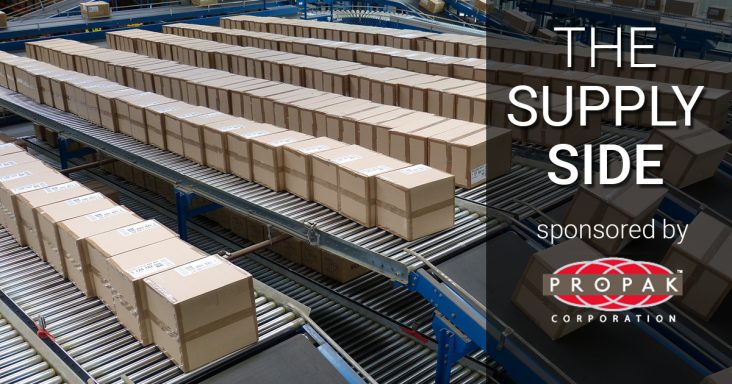The Supply Side: Deloitte report says consumer products industry expects challenging year
by February 13, 2023 1:37 pm 1,484 views

A November Deloitte survey found that 70% of consumer food and product manufacturers (CPG) indicated the sector expects this year to be more stressful than in the past five years. The survey found that 30% of CPG executives said their jobs are much more stressful.
The survey found that 80% were concerned about global economic and geopolitical stability, and 40% said the financial situation had worsened within the last year. Just 30% believe the economic picture will improve this year.
“Consumer products, as an industry, are based on stability and consistency. Now the squeeze and whipsaw of change could make this one of the most difficult periods to navigate in recent decades,” the report noted.
As consumer spending began to taper in late 2022, CPG companies said they would have to approach price increases this year cautiously. CPG executives said many of the same struggles from the past couple of years are still significant concerns. While supply chain disruptions have eased for some manufacturers, Kantar economist Doug Hermanson said during a webinar on Jan. 19 that inflation and supply chain challenges are a mixed bag depending on the category.
He said that while some agricultural commodity prices have declined from highs in mid-2022, diesel and fuel costs, labor pressures and packaging costs continue to rise. Hermanson said some CPG manufacturers would continue to raise prices this year in a climate of near-flat growth offset by inflation.
Deloitte also reports record-setting prices will persist in 2023, with 80% of CPG companies surveyed saying they are planning further price increases. Even though the high prices are bumping revenue, 56% of executives expect sales growth to be an issue, especially with consumers changing spending habits in search of better value. Deloitte found that 48% of executives think they can raise prices without materially affecting demand. Hermanson cautioned CPG companies to ensure they are providing value in the eyes of consumers if they want to protect market share.
“Companies need to rehearse their good, better, best product strategies to defend against private label penetration while also investing in those retailers most likely to stay resilient during an economic downturn,” Hermanson said.
Concerning elevated inflation, Hermanson said the reopening of China is also being watched as that will raise the demand for commodities like fuel and push transportation and manufacturing costs higher. He also warned that shoppers’ price focus might narrow this year, or they may cut back on discretionary purchases.
Deloitte found that 62% of CPG executives anticipate challenging supply chain issues this year, and 52% are shortening their supply chains to try and mitigate the risks. The report found that a majority of CPG manufacturers are investing in supply chain efficiencies, moving beyond just-in-time strategies to more just-in-case scenarios.
“Almost half of the profitable CPG respondents said they are investing in the collection of more detailed data from their supply chains,” the Deloitte report noted.
Deloitte asked respondents to describe strategies for driving profitability as they also try to overcome challenges. The report said CPG companies were focused on holding down costs, increasing efficiencies and finding creative ways to overcome industry challenges.
The survey revealed that a top challenge for CPG companies is trying to keep up with changing consumer demands. CPG companies showing good profits were more likely to invest in direct-to-consumer shopping options, and 83% had plans to invest in technology to improve customer engagement. Most CPG companies said they plan to prioritize product improvement, with 77% saying they will invest in new product innovation. The survey found that 86% of CPG companies plan to invest in technology to personalize the customer experience.
Despite the challenging economic climate, 85% of profitable CPG respondents said they plan to grow their market share. Also, the report states that 79% plan to invest more in marketing and advertising, with 48% looking at expansion through acquisition.
The survey also found that 66% of respondents are open to divestitures and investments to optimize product portfolios.
One differentiator CPG manufacturers are starting to recognize is that environmental, social and governance (ESG) objectives are on consumer radars, particularly among Gen Z shoppers (under 26 years old). Deloitte found that 97% of CPG companies in the survey have prioritized ESG, with a majority already making sustainability investments.
Kantar reports that Gen Z shoppers are the most vocal about the importance of ESG in the products they purchase. As retailers continue to compete for this growing demographic’s business, Kantar said there is a balance between price and value which can include the intrinsic sustainability factor that seems to matter so much to young shoppers.
Deloitte said slower economic conditions might make it more difficult for CPG manufacturers to keep ESG and sustainability initiatives on the priority list. The report said many consumers who value sustainability have begun to reduce their willingness to pay a premium.
“The CPG sector should not ignore the downside possibilities of consumers’ exhausted savings and a softening labor market as they seek to grow or hold on to market share,” noted Dr. Ira Kalish, chief global economist at Deloitte.
Editor’s note: The Supply Side section of Talk Business & Politics focuses on the companies, organizations, issues and individuals engaged in providing products and services to retailers. The Supply Side is managed by Talk Business & Politics and sponsored by Propak Logistics.
